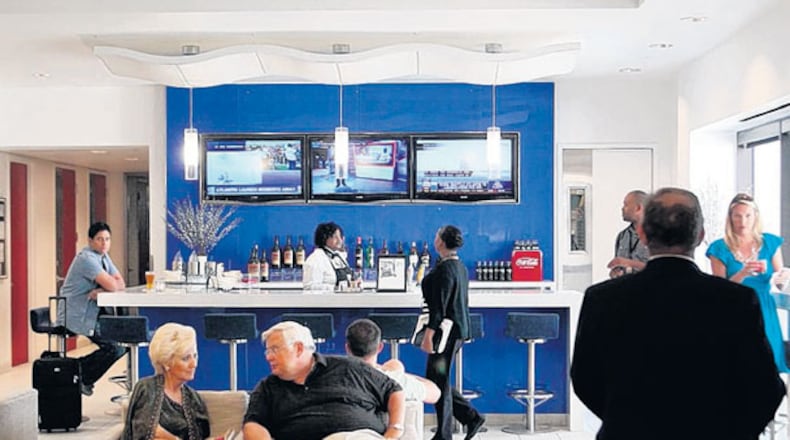Long lines and waits to get into Sky Clubs are prompting yet another move by Delta Air Lines to limit access to its posh airport lounges to reduce overcrowding.
But this time, the call is coming from inside the house.
As of Feb. 2, Delta will no longer allow employees traveling with their flight benefits to use Sky Clubs — even if they have Sky Club memberships and are traveling on company business.
Similarly banned from Sky Clubs will be pass riders and retirees using flight benefits.
The announcement by Atlanta’s hometown airline — which has thousands of employees and retirees across Georgia and the Southeast — has upset many inside the company who pay for Sky Club access to make their lives of constant travel more bearable.
Some paying crew members who are commuting to work use the clubs to shower and get food, or to nap before or after working a flight. One veteran Delta employee angered by the change told The Atlanta Journal-Constitution “it just seems unbelievable that employees using the Sky Club is causing overcrowding.”
Now some workers have joined the ranks of frustrated Delta customers who have seen increasingly tight restrictions on who can use the Sky Clubs.
The employee Sky Club restrictions are the latest air service hassle as airlines shake off upheaval from the COVID-19 pandemic. Carriers slashed jobs and then were caught short-handed when air travel demand returned. Extensions of frequent flier status led to increased demand and strain on amenities such as Sky Clubs.
Airports and concessionaires also have been squeezed by labor shortages and other issues.
Access to the airport lounges is coveted because the clubs offer a respite from bustling concourses complete with comfy lounge chairs, complimentary food and drinks, and showers at some locations. Delta has nine Sky Clubs at Hartsfield-Jackson International Airport — with one or two on each concourse — including one on international Concourse F with an outdoor deck to watch planes taking off and landing.
Delta has struggled to calibrate the balance of satisfying its legions of lucrative elite frequent fliers while maintaining a feel of exclusivity in the clubs. Even as it returned to profitability after losing billions earlier in the pandemic, Delta has cut some benefits for frequent fliers.
Last year, Delta announced that to reduce crowding, it would restrict Sky Club members’ access to within three hours of departure, and would not allow club visits after arrival at destination. The move prompted a strong backlash from frequent fliers, and Delta walked back the move to cut access after arrival.
Last November, Delta announced it would further limit access to the clubs, no longer selling memberships to anyone but elite-level Medallion frequent fliers and announcing it would hike the cost of memberships to $695 a year for a basic plan. It also halted access to elite-level frequent fliers traveling internationally unless they are in premium or business class seats, as well as to those flying on basic economy tickets without premium credit card access to the clubs.
Meanwhile, the long queues stretching down concourses to get into Sky Clubs continue, along with complaints from customers.
This week, Delta told employees in a memo: “If you’ve visited a Club recently, you may have seen lines out the door and guests – including our 360 and Diamond Medallion Members – waiting for seats once inside. This is not the experience our best customers want to have, nor the one we wish to deliver.”
The company told employees the decision to no longer allow them into clubs when they are flying “nonrev” on travel benefits “was not made lightly.”
“We are sure you’ll agree that delivering an elevated experience to our most loyal customers must be our priority,” Delta told employees.
Employees and retirees who have Sky Club access and pay air fares or miles for tickets will still be able to use the clubs. But Delta is also discontinuing its employee discount on Sky Club memberships.
The company said it will issue a prorated refund to employees and retirees who bought Sky Club memberships or paid pricey annual fees for premium American Express credit cards for access to the clubs.
Delta said in a written statement to The Atlanta Journal-Constitution that Delta employees “understand the role we all play in delivering an elevated customer experience.”
“We appreciate our people – the best in the business – who work tirelessly every day to deliver the experiences our customers have come to expect and deserve,” the company said.
The veteran Delta employee, who the AJC is not naming to protect his job, has a Sky Club membership and called the move “very uncharacteristic of the company.”
He warned that Delta and its partner American Express “forget that employees are their customers and promoters, and that may change drastically.”
Some employees want to propose alternatives to prevent the company from limiting Sky Club access to them.
For others, management’s decision on new restrictions on employee benefits could be particularly fraught as unions ramp up efforts to organize Delta flight attendants. Such union organizing efforts often benefit by mobilizing disgruntled employees who feel mistreated by the company.
The Association of Flight Attendants says on a website dedicated to organizing Delta flight attendants that a union is a “means to negotiate for our fair share of the value we create at Delta” and warns workers that Delta’s policies “are only flexible when it benefits management.”
About the Author
The Latest
Featured



